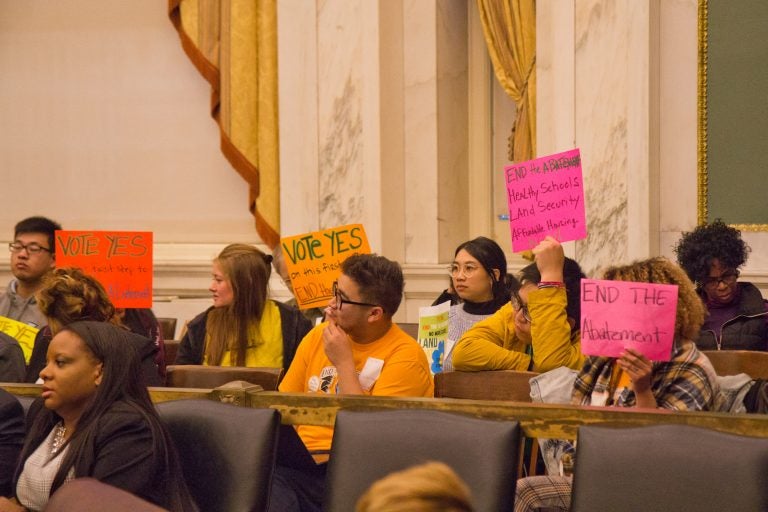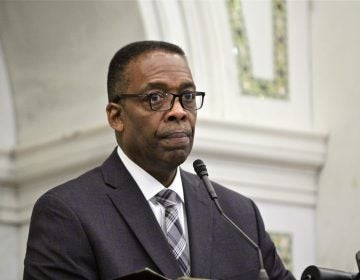Equitable or not enough? Philly Council just changed the 10-year tax abatement
After weeks of heated debate, City Council passed a bill reducing the value of Philly’s 10-year property tax abatement on new residential construction.

Activists urge City Council members to vote to end the 10-year property tax abatement. (Kimberly Paynter/WHYY)
After weeks of heated debate, City Council President Darrell Clarke’s reform to the 10-year property tax abatement on new residential construction moved smoothly through the legislative body. It passed 17-to-0 on Thursday, the last City Council session of the term.
Mayor Jim Kenney has already promised to sign the bill into law before the end of the year.
The long-awaited reform essentially halves the value of the controversial tax incentive, which was established in the 1990s to encourage development in the city after decades of urban population loss.
Philadelphia no longer needs to be so generous in stoking new development, Clarke said Thursday. He did not rule out further changes in the new year.
“There are a lot of people that would like to see this go further,” Clarke said. “But we think we hit the sweet spot in terms of being fair and equitable. The conversation around that will probably continue.”
The bill will phase out each individual abatement so that the tax break’s value will be 100% in the first year and ratchet down 10% each subsequent year. It will go into effect at the beginning of 2021. The starting date reflects a concession to the development industry won after Mayor Jim Kenney threatened a pocket veto of the legislation if the implementation date was not pushed back.
Dissenters spoke out during City Council’s public comment period, calling for more radical reform.
“Although this bill is a small step towards ending the 10-year tax abatement it is only a small step that will take way too long to get funding to our schools,” said Many Duong, a student-teacher at Furness High School.
The bill does not touch the 10-year abatement for commercial buildings nor the one for extensive rehabilitation of housing. Clarke said that he intended to focus more on incentivizing the preservation of homes that already exist.
“We will be pushing forward on incentives to ensure that areas like Olney, Oak Lane, and parts of South and West Philly that aren’t seeing the level of growth will be in a position to do so,” Clarke said.
When City Council began seriously considering abatement reform after the November election, another bill was on the table. That bill would have created a cap on the tax break, exempting values above a certain price point from the tax break. But there wasn’t the support to move it forward, so Clarke dropped it before it could be introduced.
The abatement reform happened quickly after Kendra Brooks of the Working Families Party won a seat on the body, taking over a seat long held by Republicans. Three other longtime Clarke allies are also retiring, to be replaced by younger and, in some cases, more progressive politicians.
The legislation includes language that will require a review of the abatement every three years, to see how changes to the policy have affected the housing market.
The administration of Mayor Jim Kenney is very supportive of that idea.
“In three years, we can compare the two and say what kind of effect did the change we made have on the market,” said Jim Engler, Mayor Kenney’s chief of staff, and how can we continue to tweak it to make sure it matches our end goal of inclusive growth.”
An increase of the Homestead Exemption to give homeowners a break on their property taxes passed as well.
WHYY is your source for fact-based, in-depth journalism and information. As a nonprofit organization, we rely on financial support from readers like you. Please give today.







